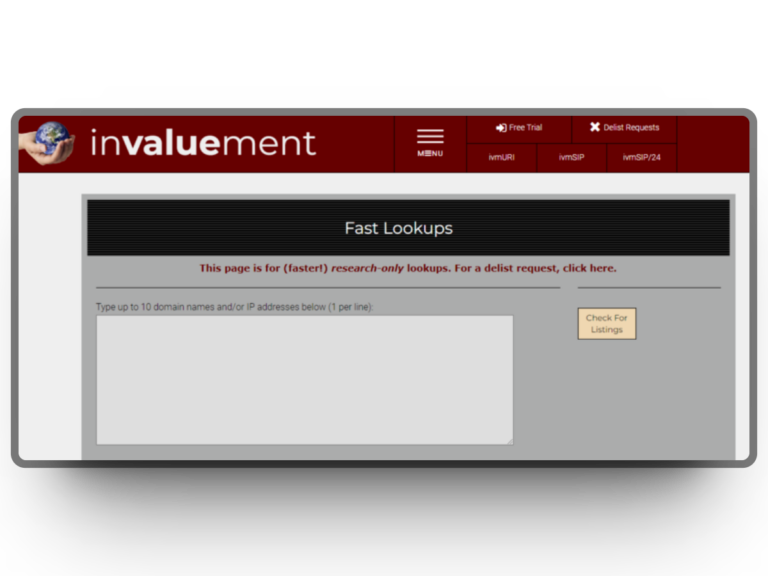IVMSIP (Internet Video Media Stream IP) blacklist is an online security measure designed to protect businesses, organizations, and individuals from cyberattacks.
It works by blocking malicious IP addresses or ranges of IPs that could potentially be used for malicious activities such as DDOS attacks, spamming emails and scanning systems for vulnerabilities.
Unfortunately, if your own IP address has been added to this list then you may experience difficulties accessing certain websites or services on the internet.
Knowing how to remove yourself from IVMSIP can help restore your access and keep you safe online. In this post, we will look at what the IVMSIP blacklist is, why it’s important, and most importantly – how to remove your own IP from it!
What is IVMSIP blacklist?

IVMSIP Blacklist is a real-time blacklist database that is used by many email service providers to identify and block incoming email messages from known sources of spam, phishing, and other types of malicious content. IVMSIP stands for “Internet Video Monitoring System IP” and is a technology used to monitor video cameras over the internet.
The IVMSIP Blacklist is maintained by the IVMSIP project team, and it contains a list of IP addresses that have been identified as sources of spam and other types of malicious content. When an email service provider receives an incoming email message, it checks the IP address of the sender against the IVMSIP Blacklist. If the IP address is found on the blacklist, the email is rejected or marked as spam.
The IVMSIP Blacklist is updated in real-time, meaning that new sources of spam and other malicious content are added to the list as they are detected. This helps to ensure that email service providers are able to block incoming email messages from new sources of spam and other malicious content as quickly as possible.
It is important to note that being on the IVMSIP Blacklist does not necessarily mean that an IP address is engaged in malicious activity. In some cases, legitimate email senders may be added to the blacklist if their emails are mistakenly identified as spam or if their systems have been compromised by a third party.
To ensure that your IP address is not on the IVMSIP Blacklist, you can regularly monitor your email deliverability rates and take steps to prevent your emails from being identified as spam. This includes implementing best practices for email authentication, such as SPF, DKIM, and DMARC, and ensuring that your email content is high-quality and relevant to your recipients.
How does IVMSIP blacklist work?
When an email service provider receives an incoming email message, it checks the IP address of the sender against the IVMSIP Blacklist. If the IP address is found on the blacklist, the email is either rejected or marked as spam. This helps to prevent malicious emails from reaching the recipient’s inbox.
The IVMSIP Blacklist works by using a combination of automated tools and human expertise to identify sources of spam and other malicious content. The database is updated in real-time, which means that new sources of spam and other malicious content are added to the list as soon as they are detected.
The IVMSIP project team uses a variety of techniques to identify sources of spam and other malicious content. This includes monitoring the behavior of email senders, analyzing the content of incoming email messages, and using machine learning algorithms to identify patterns and trends.
How to check if my IP is on the IVMSIP blacklist?
To check if your IP address is on the IVMSIP Blacklist, you can follow these steps:
1. Go to IVMSIP Blacklist site.
2. Enter your IP address in the search bar provided on the website.
3. Click the “Check for listing” button.
Review the results. If your IP address is listed on the IVMSIP Blacklist or any other blacklist, the tool will indicate it.
How to remove your IP from IVMSIP blacklist?
Email warm-up service Warmy.io can also help improve your sender reputation and prevent blacklisting by providing the following features and best practices:
✅ Gradual email sending
Warmy.io sends your emails gradually over time to gradually ramp up your sending volume and prevent triggering spam filters or being flagged as suspicious by ISPs.
✅ IP rotation
Warmy.io rotates your sending IP addresses to help prevent blacklisting and improve your sender reputation by ensuring that your emails are not associated with any previous blacklisted IP addresses.
✅ Feedback loop monitoring
Warmy.io monitors feedback loops from major ISPs to identify complaints and take corrective action before they impact your sender reputation.
✅ Reputation management
Warmy.io actively monitors and manages your sender reputation, including tracking your sender score and taking corrective action if necessary to ensure that your emails are being delivered to inboxes.
✅ Deliverability testing
Warmy.io provides deliverability testing to identify and address any potential issues that could negatively impact your email deliverability, such as content, formatting, or technical issues.
By leveraging these best practices and features, Warmy.io can help you improve your email deliverability and prevent blacklisting, ultimately improving your email marketing ROI and driving more conversions.
Conclusion
It is important to note that the blacklisting of your IP address doesn’t always signal malicious network activity. Its accuracy can be affected by the settings and algorithms of the blacklist, so it’s important to read all the information they have and make sure you react accordingly.
Blacklisting can range from monitoring a web application to keeping an entire block of IPs on a watch list. Fortunately, if you find yourself on a blacklist, there are steps you can take to remove your IP address from it. You can either request removal or use methods like proxy rotating or the ExpressVPN service to protect both your data and identity in case there is any malicious intent present.
Additionally, with proactive measures such as staying up-to-date on software updates and having effective Anti-Viruses installed, you should hopefully have no issues with endangering your network and ultimately avoiding having your IP address blacklisted.
To ensure that none of these events occur again in the future, regular checks would also benefit immensely; this way, not only will you protect yourself but also give yourself maximum privacy protection at all times.











